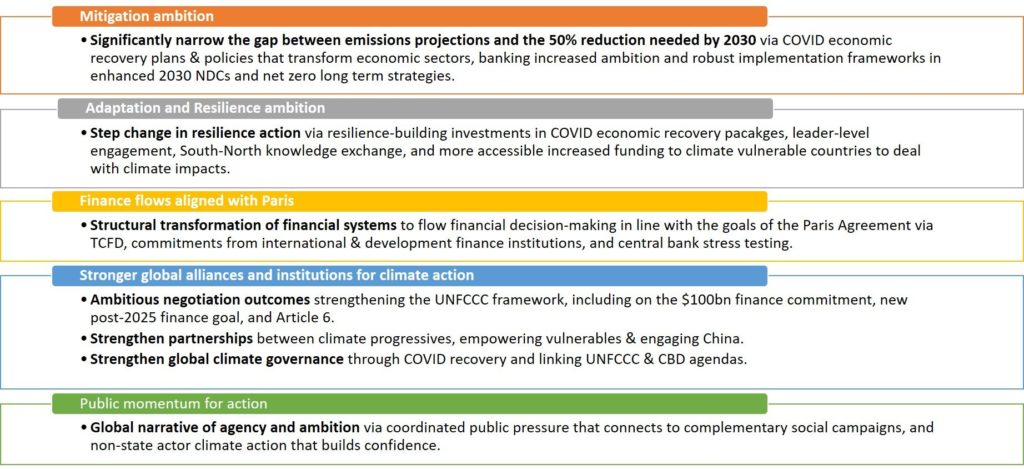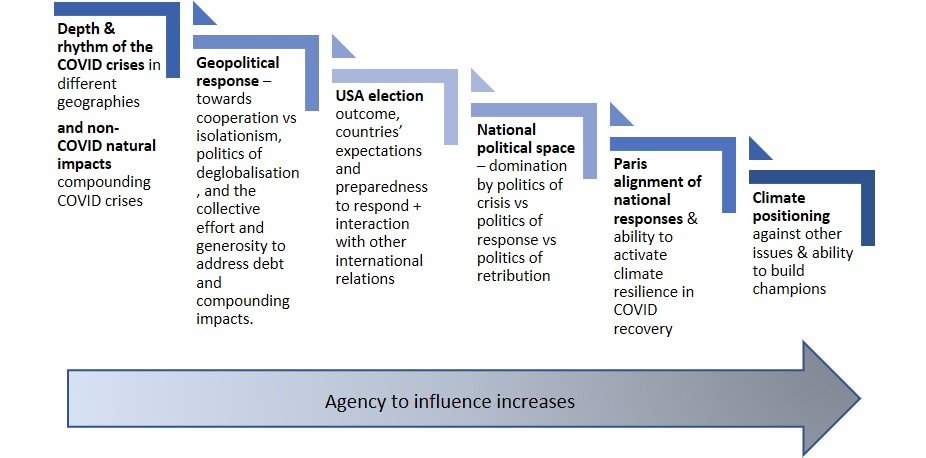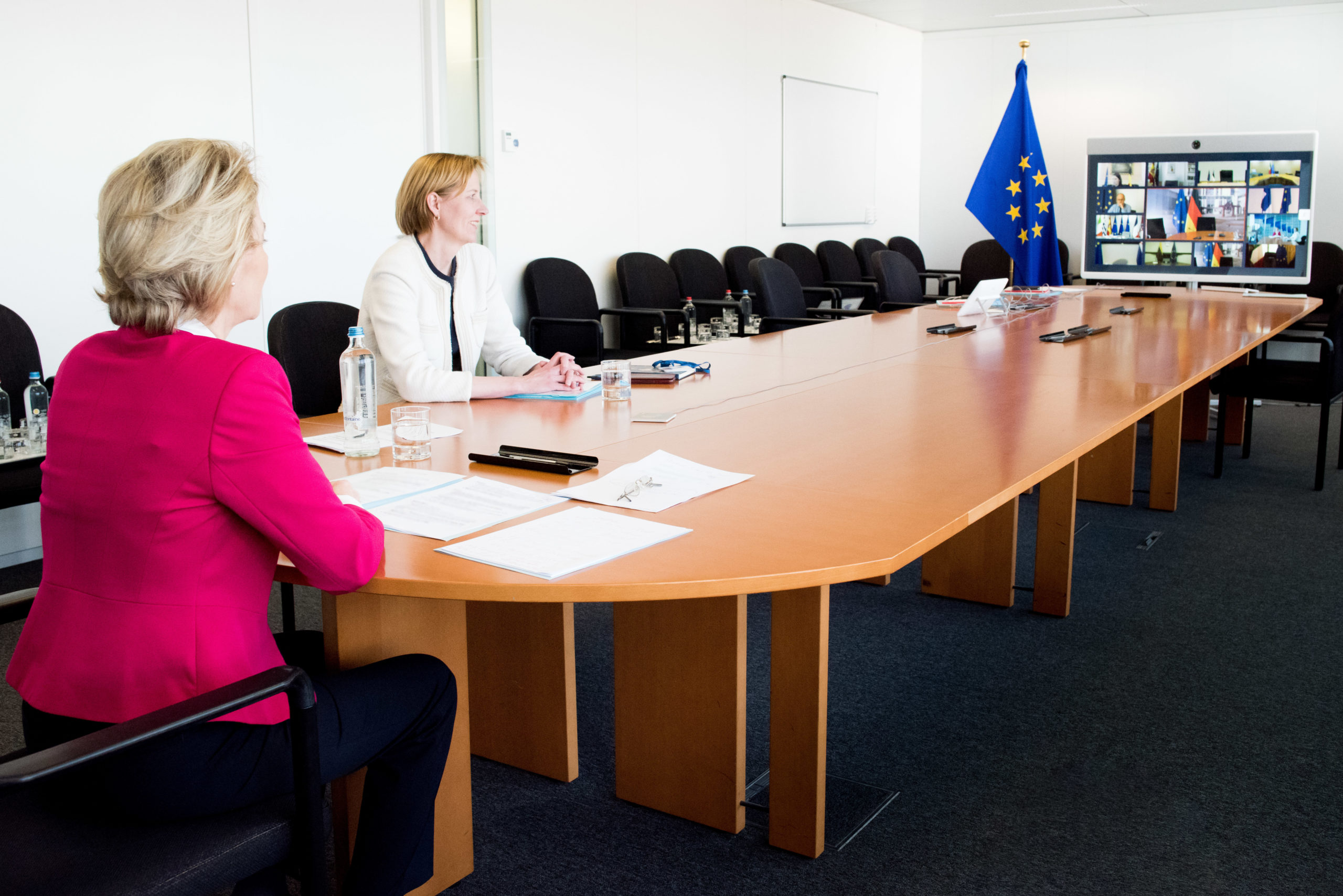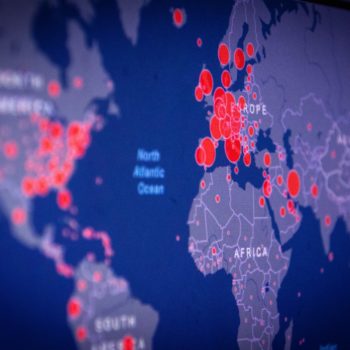COVID-19 has changed the pathway to the annual UN climate summit (COP). With the COP26 Glasgow Summit now postponed until November 2021, it is no longer a venue to shape the geopolitical agenda. Instead, it is better thought of as a well-placed ‘adjudicator’ of the next 18 months.
The talks will provide a moment when the world – from all countries, and across all of society, from leaders to citizens, climate activists to investors – will gather to take stock of where we are in the battle against climate change (see ‘5 Key Tests to Adjudicate at COP26’). The question COP26 will judge is the same: are we doing enough to meet the goals of the Paris Agreement?

5 Key Tests to Adjudicate at COP26
The next year and a half will decide the answer. This period of time must be used to deliver maximum progress on climate action. Crucially, the world must reflect, in its response to the COVID-19 crisis, the scale and urgency of climate action needed over the next decade to deliver climate safety. This means more than merely setting targets. Success at COP26 will require global cooperation to deliver the systems and politics that can accelerate and scrutinise climate action beyond the event itself.
Same asks, different venues and timelines
COVID-19 demands us to do things differently. The big decisions deciding the fate of global climate action won’t be taking place in multilateral talks between environment ministers at events hosted by the UN Framework Convention on Climate Change (UNFCCC) or the Ministerial on Climate Action.
The dealmakers of the trillion-dollar investments that could spur a green, fair and resilient COVID-19 recovery will be world leaders, finance ministers, and central bankers. As such, climate advocacy strategies need to be resituated to deliver in the venues that matter for these people – the G7, the G20, the Finance In Common Summit, to name just a few. In the past, Nationally Determined Contributions (NDCs) were the main hook for banking transformative climate action, now recovery pledges have taken over. As a result, climate outcomes will need to be delivered through recovery packages and then banked into NDCs and climate policy frameworks.
In other words, we must now accelerate efforts to mainstream climate into financial, economic and planning agendas. Before COVID-19, that was a mission for the next decade. Now it’s a mission for the next 12 months.
How do we act despite all the uncertainty?
The next year is mired in uncertainty. The diplomatic calendar has been turned on its head, with key meetings either cancelled, taking place online, or postponed. We still don’t know how the COVID-19 pandemic will unfold – whether there will be a second wave, or when we might discover a vaccine. Looming over all of this is the big question of the US Presidential election.
We need to get used to living with uncertainty. The truth is that we will never have total clarity on the road to COP26. Instead, we need to operate in spite of these challenges.
To help navigate this complex landscape, E3G has led discussions with governments and civil society mapping out the key drivers for geopolitics over the next 18 months. Not all of them are under our control – we have varying agency to influence them (see ‘Key geopolitical drivers over the next 18 months’).

Key geopolitical drivers over the next 18 months
Recommendations
From our analysis, E3G can see at least a few initial steps to help the climate community drive forward action and avoid getting overwhelmed by the uncertainty COVID-19 brings.
1. Joining up climate, social, and health agendas
Firstly, the climate community has a good deal of agency to control how climate is positioned relative to other key issues. This includes the health crisis and rising social inequality – both within countries and globally between the developed and developing world.
To avoid climate change being pitted in competition against these equally important agendas, climate actors must forge alliances with health and development communities. By aligning our asks of world leaders, climate can remain relevant, and help amplify and enhance outcomes across all these agendas.
2. Cooperating on delivering a green, fair and resilient recovery
Secondly, climate actors can influence economic recoveries to ensure they deliver green, socially just and resilient outcomes. At the international level, we must help this process by fostering global cooperation. E3G has been closely monitoring the latest geopolitical developments in order to better understand the landscape in which cooperation must be constructed. Our initial findings from this exercise has shown that despite COVID-19, climate change remains an area where countries have been willing to cooperate.
This in turn can bolster multilateralism more broadly, which will be essential for accelerating global climate action. To help these aims, E3G has been mapping global platforms for cooperation across a wide range of issues, including security, finance, peacebuilding and more. In doing so, we have identified key gaps in global cooperation platforms that must be addressed in order to build cooperative geopolitics that deliver for COP26.
Alongside greater coordination to address the immediate health and social crises, key gaps to address include;
- Creating mechanisms to restructure debt and ensure fiscal liquidity to align financial flows with the Paris Agreement and Sustainable Development Goals
- Establishing leader level engagement on incentivising resilience in the global system
- Agreeing on a common taxonomy and mechanism for assessing the sustainability credentials of recovery packages.
3. Adjusting to the new venues
Thirdly, climate actors need to be open to the changing geopolitical landscape. The climate community need to pay attention to the COVID-19 recovery conversation. This is presenting itself as a new source of impetus for driving global climate action. There will be times when we need to adapt our climate strategies to speak to these issues, as they carry more weight than traditional climate policy mechanisms such as NDCs.
We need to be flexible: ready to adapt our strategies for climate action, so they can take advantage of the conversations that leaders are having, in the venues where they are taking place, and to the timelines they are now taking place.
Next steps: implementing a roadmap to COP26
With these considerations in mind, climate actors must now begin designing and implementing a roadmap to COP26. To build a new drumbeat towards Glasgow, the roadmap should set out benchmarks for key climate action outcomes, a delivery timeline, and identify key venues.
Key criteria for a roadmap
In planning this roadmap to COP26, we should start by preparing for a ‘best case scenario’ in which the timelines for key decisions and diplomatic events are not delayed further due to any second global wave of the disease. Otherwise we risk missing narrow windows of opportunity that may present themselves. ‘Best case scenario’ baseline assumptions include the election of a US President who supports the Paris Agreement this November, and sufficient action to create fiscal sustainability for debt-stressed developing countries.
Climate action strategies with these assumptions must then be stress tested against the potential for disruption, including a resurgent aggressively pro-fossil fuel Trump re-election, and widespread escalating pressure in developing countries brought by compounding crises of food insecurity, COVID-19 and economic collapse. Contingency plans should be developed to ensure climate action is able to handle these shocks.
To be resilient, the roadmap will need to draw on alternative hooks to ensure climate action retains its resonance with world leaders. For instance, the road map should draw on links to the nature crisis, health security and the imperative of economic recovery instead of merely relying on the climate agenda.
The roadmap also must be sensitive to the critical role that national-level politics occupies within global climate action. Lobbying and campaigning will be essential at the national level, in order to persuade governments to step into the new political space for ‘building back better’ currently being created on the international agenda.
E3G is working with international partners in governments and civil society networks to design such a roadmap to COP26. In doing so, we hope our analysis is able to provide a glimmer of certainty, confidence and agency to the climate change community, despite the chaos of the current world.



